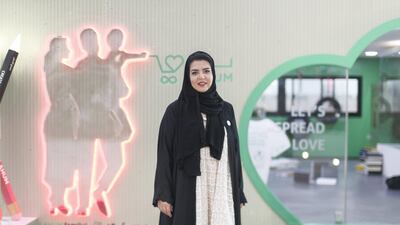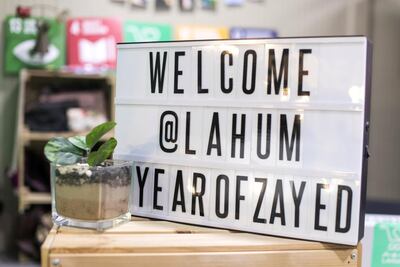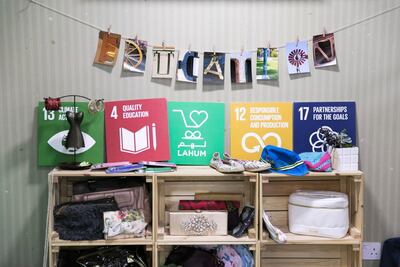The idea had been at the back of Ameera Amir's mind for some time: to open a thrift shop and use its proceeds to fund scholarships for children from lower-income families.
It picked up momentum, however, during early discussions about the Year of Zayed. This is apt, given the Founding Father’s commitment to principles such as education and sustainability, and respect for all mankind – values that Amir has also dedicated her working life to. Nonetheless, when she soft-launched Lahum at Abu Dhabi’s Masdar Park in January, Amir wasn’t sure whether one key part of her plan would work.
“I didn’t think really anyone would buy, because it’s a new concept,” she says. “People are used to donating clothes and those clothes going to people in need, but the concept of reselling in a thrift store?”
In the first of a series of happy surprises for Lahum, which means “for them” and refers to children, Abu Dhabi’s community has been buying away. This includes an Alexander McQueen wedding dress, sold for Dh200 to a woman who claimed she was acquiring it for a friend. When she returned to re-donate the dress, she confessed it was for her own wedding. Another woman, a lawyer, picked up several abayas to wear on a business trip to Saudi Arabia, says Amir. “She said: ‘You know, I’d hate for me as a mother not to have enough funds for my child to go to school, so I’m more than happy to support this,’” recalls Amir.
That was another adjustment Amir had to make to her expectations for the concept: she initially imagined that Lahum would appeal to and should target lower-income members of the community. “I realised that no, people are passionate about the cause.”
Amir dreams of going on to establish Lahum stores across the UAE, and hopes to create the kind of brand recognition enjoyed by similar concepts in other countries, such as Canada’s Value Village, but with a more far-reaching impact on the community.
She pays the administration costs and salaries of her two full-time employees herself, so all funds can go towards the scholarships, and she has partnered with the Abu Dhabi Education Council in low-income communities to identify children in need. In the three months since Lahum launched – the official opening is this week – the shop has already raised enough to cover at least three scholarships.
Amir's passion for education also reflects her own feelings about Sheikh Zayed, who paid families in a newly formed UAE to send their children to school. "I made it a point to get the highest level of education myself," she says.
“I wanted to learn so I could always do things better.” With a master’s in international affairs and sustainable economic development from Columbia University in New York, she runs her father’s business conglomerate in the private sector, holds advisory roles in the Abu Dhabi government, sits on several boards and runs a number of private businesses. Lahum’s model also reflects Amir’s passion for social enterprise over charity. One of her other initiatives, Weyakum, helps young people in the UAE realise their educational and professional aspirations. It has been recognised with an Impact of Youth Development award.
And then there is the dedication to sustainability, which is seen in every aspect of Lahum. Located in four shipping containers designed to look like an open cardboard box, it is decorated inside with recycled tyres, upcycled oil barrels, a giant sign made from old Spinney’s cartons and trendy-looking price tags fashioned from cereal boxes.
_________________________
Read more:
UAE residents cash in on the surging second hand market
Broke after the holidays? Here are 20 tips to get your finances back on track in the UAE
Bargain hunt Abu Dhabi: thrifty places to buy and sell
_________________________
Throughout, there are messages about the environmental menace that is the fashion and textile industry, which gobbles up non-renewable resources – and a dwindling supply of water – at an unsustainable pace, exacerbated by consumer dedication to fast fashion, clothes that are commonly worn and discarded within a year. “It’s the second biggest pollutant after the oil and gas industry,” says Amir. “So we do all these awareness campaigns.”
To this end, Lahum has already held several educational workshops for children, and will hold more in September, in collaboration with Environment Agency Abu Dhabi. The two organisations are also producing the first report with statistics on the UAE's rate of textile waste.
Amir makes sure to oversee every aspect of Lahum, right down to its green heart and shopping cart logo, which she designed herself. “One of the biggest things for me is I want this process to be 100 per cent transparent, so if tomorrow you donated clothes to me, I can tell you: ‘Hey, by the way, you donated some items, this is how it went, this is how much was raised,’” she says.
Lahum at Masdar Park in Abu Dhabi is open daily from 4pm to 9pm, but closed on Sundays.
For more information, check it out on Facebook, Instagram @Lahum_UAE or email hello@lahum.org
Donate wisely
So far, Abu Dhabi residents have dropped off a steady stream of worthy items at Lahum, says the thrift shop's founder Ameera Amir.
Unsurprisingly, designer pieces get snapped up quickly. A Balenciaga jacket, for example, went for Dh200. And although Amir wants to cap prices at Dh500, she did sell one Chanel bag for Dh2,000. Among the finds this weekend was a faux-fur jacket from A/X Exchange, a kaftan that looked as though it might be Missoni (but wasn't), several bejewelled clutches and some sparkly children's party dresses, still bearing their original tags.
Where possible and with permission, Lahum tries to connect those who donated items with the people who bought them, via Instagram, which is helping to build a community around the store. And while in the beginning there were some questionable donations – no one wants to buy free hotel slippers, for example – the team has been successful in gently educating people who donate that Lahum is more discerning than a charity bin.
"So now everybody who comes, knows they can't just drop it off; we check it," says Amir. "Everybody brings great stuff. A lot of people bring items with tags on them, kids' clothes, because they say that people got them a lot of presents and their child didn't have a chance to wear it."



